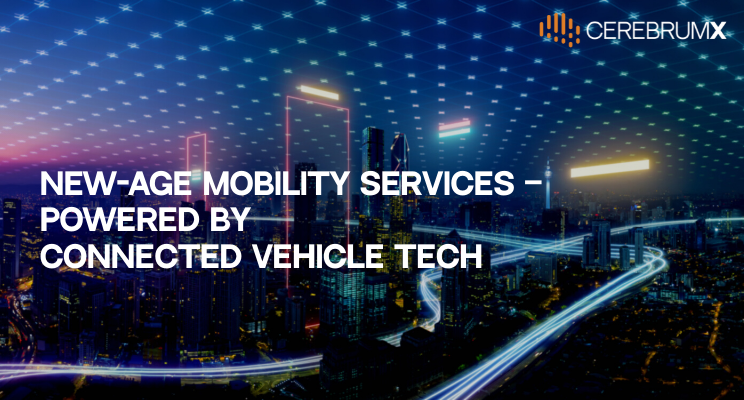Vehicle Progressive Data-based Services offers a superior marketing infrastructure intended to deliver a complete view of customers and prospects. There exists little doubt about the progress the global automotive industry has made in the last decade, despite the slowdowns of the worldwide pandemic. Maintaining pace with the rise in digital transformations while keeping at par with the dynamic customer demands, the industry has come a long way from traditional transportation practices to a unique yet compelling blend of auto services that offer users versatility, variety and convenience.
Targeted at delivering similar user experiences with heightened levels of ease, connected vehicle technology is the latest tech that promises revolutionary upgrades to transportation experiences as we know it today.
Vehicle Progressive Data-based Services
Here is a list of progressive data-based services that hold real-life practicality when implemented in conjunction with vehicle data and mobility intelligence.
- Warranty-as-a-Service (WaaS)
- Tire-as-a-Service (TaaS)
- Mobility-as-a-Service (MaaS)
- Battery-as-a-Service (BaaS)
Read more about different vehicle progressive data-based services below.
1. Warranty-as-a-Service (WaaS)
Connected vehicle data opens opportunities for auto service providers and businesses to present customers with usage-based subscription models based on their dynamic usage trends. WaaS factors in variability in the vehicle’s risk profile, as well as the flexibility in the customer’s needs, while allowing customers to choose appropriate protection for their vehicles for either a set period of time or a longer continual duration, as per their needs.
In addition to strategic planning and attractive product positioning, WaaS business goals confide in the granularities captured by connected car data. By actively collecting and assessing vehicle data, such as health indicators, error codes, real-time telemetry, and collision data among other parameters, warranty service providers can actually predict usage patterns for specific customers and make WaaS assessments easier.
2. Tire-as-a-Service (TaaS)
Another budding service model based on the principles of product-as-a-service is the TaaS architecture that revolves around the concept of positioning tires as a service, that can be availed as a desired outcome or need. Successful implementation can include quarterly services for winter tires in snow-heavy locations, or rain tires in areas with a significantly high downpours.
The TaaS model can leverage data pertaining to vehicle usage, including trip parameters, odometer readings and tire pressure, as well as driving metrics such as rapid acceleration, braking, swerving and more, to determine tire tread and remaining life. Correspondingly, tire manufactures will be able to offer their services at the right place and time, and to the right customers.
3. Mobility-as-a-Service (MaaS): Vehicle Progressive Data-based Services
MaaS is a rather new addition to the list of modern data-based solutions that promote integrated mobility, through a single platform that solves all transportation challenges by shifting away from personally-owned vehicles. When fed with connected vehicle data, and analyzed using AI and deep learning, MaaS enables users to plan, book and utilize mobility provided as a service.
Connected vehicles supply the intelligence required by MaaS models to establish a streamlined transit network of shared mobility vehicles as well as station sites, that eventually assist in the reduction of city congestion. On-demand mobility consumes vehicle data concerning trip parameters, traffic patterns, driver behavior and more, to allow consumers get access to safer, efficient and personalized journeys, right from planning till completion.
4. Battery-as-a-Service (BaaS)
Owing to the growing popularity of battery electric vehicles with rechargeable batteries and no gasoline engines, BaaS is a concept with high business potential. Essentially allowing customers to lease batteries as a separate component from cars, and swapping it for a new one every time it drains out of charge, BaaS addresses incessant EV issues including range anxiety, high upfront costs and a time-consuming charging process.
Data from connected vehicles support with identifying the most relevant sites to set up a battery swapping station, considering real-time movement of EVs and vehicle density, automating site operations for most common battery issues, by measuring battery performance across numerous vehicles, as well as educating drivers on optimizing energy consumption through data-based efficiency assessment.
Extend a Rewarding Experience to Your Customers with CerebrumX
Powered by CEREBRUMX’s range of advanced data solutions, offering new-gen mobility services to your customers is as easy as thinking about it. Take advantage of our AI-powered Augmented Deep Learning Platform (ADLP) to unlock the true value of connected vehicle data and gain insights that’ll empower you to step into the exciting realm of intelligent connected mobility services aimed at upgrading the customer experience. What’s more, do away with the need to deploy complex infrastructure and high initial costs, by leveraging your existing networks in fusion with our easily integrable APIs, to ensure that your customers don’t drift away from your brand.
When it comes to consumer’s data privacy and security, CEREBRUMX believes in total transparency when dealing with sensitive data. To ensure complete trust and uninterrupted business operations, we enable you to give the power back to the customers by letting them grant, revoke or edit consents for data transactions easily, with our white label platform, CerebrumX Secure Consent.
For more information regarding connected vehicle data and the evolving ecosystem around it, Contact us or reach out to our experts.

